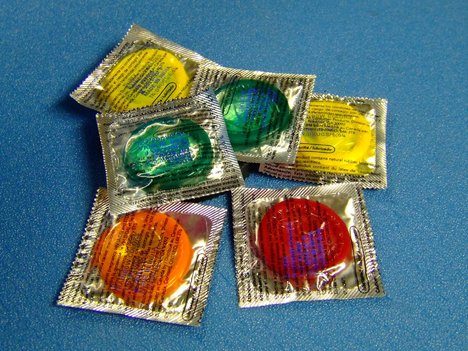School principals get ‘hands on’ experience with condoms

AP PHOTO
MANILA, Philippines—While the debate over the reproductive health bill rages, elderly school principals and other Department of Education officials are getting a “hands on” experience with condoms—some for the very first time—and interacting with people living with HIV/AIDS.
Anne Quizon, DepEd HIV program coordinator, said school officials are getting the chance to meet with those infected with HIV as the department starts training all of its 600,000 teaching and non-teaching personnel across the country under its HIV/AIDS Prevention and Control Policy in the Workplace Program.
Education Secretary Armin Luistro, a La Salle brother, implemented the training program in May as part of government efforts to stop the spread of HIV in the country and the stigma associated with the virus.
“It’s a real eye-opener. Some are happy, others are sad, angry or are scandalized at first but in the end they all accept it,” Quizon told a recent forum organized by the Philippine National AIDS Council.
“They internalize it. And with the end of each training, I’m happy to say we have more HIV(-prevention) advocates and trainers. It’s so heart-warming,” she added.
Article continues after this advertisementUnder the program, Deped officials and employees are educated about sexually transmitted infections, HIV, AIDS and how to prevent them from spreading. They are also taught how to prevent discrimination against people with HIV and what to do if they are infected.
Article continues after this advertisementSo far, DepED has been able to train its medical staff and administrative officers, like supervisors and principals from the National Capital Region, Davao, Central Visayas, Central Luzon, Calabarzon and Mimaropa regions.
“There are so many stories.We had a (school) supervisor, who’s retiring in four years, and it was her very first time to see a condom. When we opened it, she said: ‘Ano yan (What is that)?… I haven’t touched one yet,'” Quizon quoted the supervisor as saying.
“So, she touched it and it was really an eye-opener. I mean, you’re retiring already but you haven’t even seen a condom yet, much less touched one. So, at least she was able to touch one, even if it was just the condom,” she added in jest.
Quizon said this was important because, if public school students are to be taught about sex and sexuality, their teachers should have the correct knowledge of the subject.
“HIV is spreading also because of wrong information,” she said.
Quizon said there have been poignant moments when school officials met and got to interact with people living with HIV/AIDS.
“In one division, they were pleasantly surprised when one of the (HIV-positive persons) came forward and told one of the school principals, `Ma’am, I was once your student’,” Quizon said.
“The principal said, `What? I didn’t know, hijo. How are you?’ and it was a heartening feeling because the acceptance was already there,” she said.
Quizon said many of the participants were also surprised that many of those with HIV/AIDS were young people.
“They were expecting that people living with HIV would be older and then they see them and they are young. It hammers down the core message that (the school officials are ) supposed to be responsible for young people who are at risk,” she said.
“They can see that these are real people from the positive community and they are working with us and they are there,” she added.
Quizon said the feedback had been very positive with principals offering to send their staff to Red Cross blood letting operations while others offered financial help to the persons infected with HIV.
“It’s really heartwarming. Some were crying because they had internalized what happened. One participant immediately called up a son who was working abroad and said, ‘Son, have you had yourself tested for HIV? If you’re positive, come and I’ll understand you. Just tell me,’” Quizon said.
“Many of them, at the end of the workshop, realized that we have much responsibility to our own children, to our own students and especially to our own families,”she said.
“If you are with us and you see the response, it’s really heart warming. There was a comment from someone who said, `You’ve opened DepEd to the HIV community.’ It has been very heartwarming,” Quizon added.